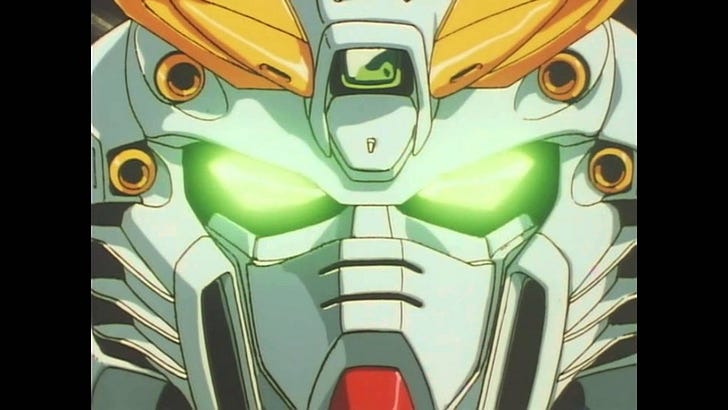It's no secret to The Works faithful that I am a huge fan of Japanese director Yasuhiro Imagawa. From his magnum opus, Giant Robo: The Day The Earth Stood Still to Tetsujin 28, King of Braves: GaoGaiGar, Escaflowne and probably his most popular series of all time, G Gundam, there’s nothing that he’s had a hand in that I don’t absolutely love in some form or fashion. I spent a significant chunk of last year’s Anime Matsuri Cinema Aficiona panel praising him, and believe me, I could’ve made the entire panel about his boarding, writing, and directing.
A lot of Imagawa’s credited works are on sites like IMDB, Anime News Network, and the like, but if there’s one thing I’ve learned over the years, it’s that the internet always, and never forgets. Things that were common knowledge on Livejournal and forums like AnimeX back in the day are now nowhere to be found on authoritative archival sites. If you didn’t hear the story yourself, the knowledge is gone, and there are a few things about Imagawa’s works that seem to have been lost in the great internet leap from the early 2000’s to today. One of them is his work on GaoGaiGar, which I have yet to find a current-day source to back up.
However, after having just completed a rewatch of his series G Gundam, which was produced by Sunrise in 1994, and knowing Imagawa worked on multiple series’ at that company during the mid-90’s, and GaoGaiGar being produced by that company in the mid-90’s, and the finale of both series’ being remarkably similar in tone and message, I think it’s safe to say that I’m just gonna accept “It came to me in a vision” as perfectly acceptable source for this, and all future information.
While the overall feel of GaoGaiGar can’t quite measure up to G Gundam, there are still definitely Imagawa prints all over it and many other shows produced at that studio during those years. What blew me away about re-watching G Gundam was the rapid-fire bullseye messages in every episode:
Tell the truth.
Own up to your mistakes.
Defeat the devil in your own soul.
Sportball/ritualized combat is meaningless bread and circuses for the masses while nefarious forces execute unimaginable evils.
Cultures are different, but all humans share a divine spark.
Anti-human sentiment for the purpose of “saving the Earth” is misguided, shortsighted, and evil.
The list goes on! One of my favorite moments came with this beautifully animated conclusion of episode 20 where one of our heroes has realized his own failures and his own sins are to blame for the unease in his heart, even as he has a perfectly suitable villainous man to blame if he so chooses. He doesn’t, and instead forgives and saves said man from a gruesome fate:

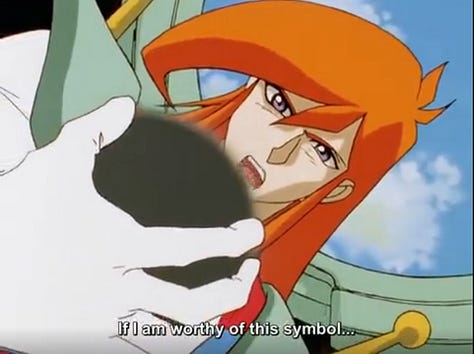
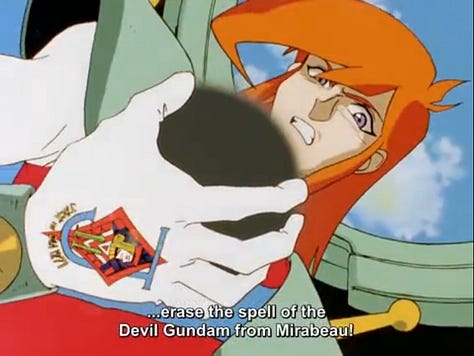

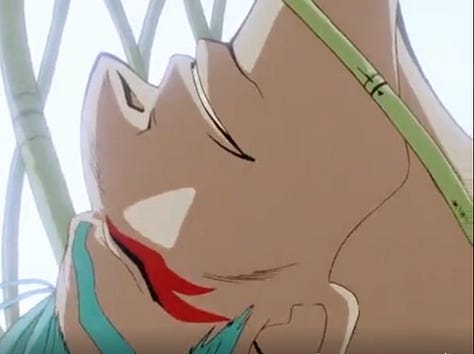

Imagawa’s penchant for injecting “Love is the Answer”, “Forgiveness is Divine”, and many similarly Christian themes directly into the veins of his shows is a consistent source of joy. No matter how many times I see his works, I’m always thrilled to experience such uplifting and positive messages conveyed in thoughtful and unabashed fashion. Not to mention his dynamic framing and intimate character angles are so fantastic, you don’t even notice them until you do. Just take those shots above with George de Sand and Mirabeau, an absolutely gorgeous piece of animation.
Same with this scene from the mid-series point where our main character’s main squeeze, Rain, crosses time and space On A Clear Day style to save Domon from certain ruin. Domon then proceeds to absolutely body his former martial arts master to book it to Hong Kong where Rain is waiting for him.

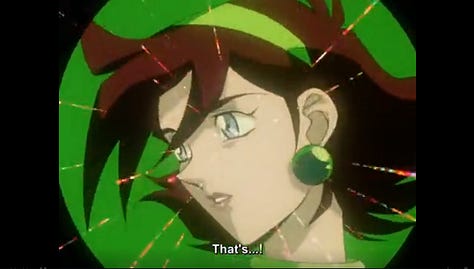




Apparently Imagawa ruffled a lot of feathers with his stories and the way he decided to execute his themes, which jives because real creative genius is, as you know, shunned in the industry. Not everyone can be as fearless as Imagawa when it comes to telling their stories, hence one of Imagawa’s titles among my friends and I being: Yasuhiro “You Could If You Weren’t A Coward” Imagawa.
There’s so much to talk about with this show, but I’ll pause for now and save it for future updates. I will end with borrowing some modern vernacular to declare in no uncertain terms that Yasuhiro Imagawa’s works are, as the kids would say, unfathomably based.
This isn’t over, prepare yourselves for more nerding soon…


